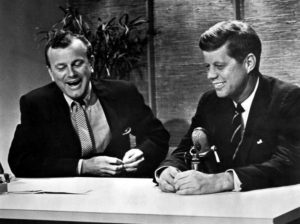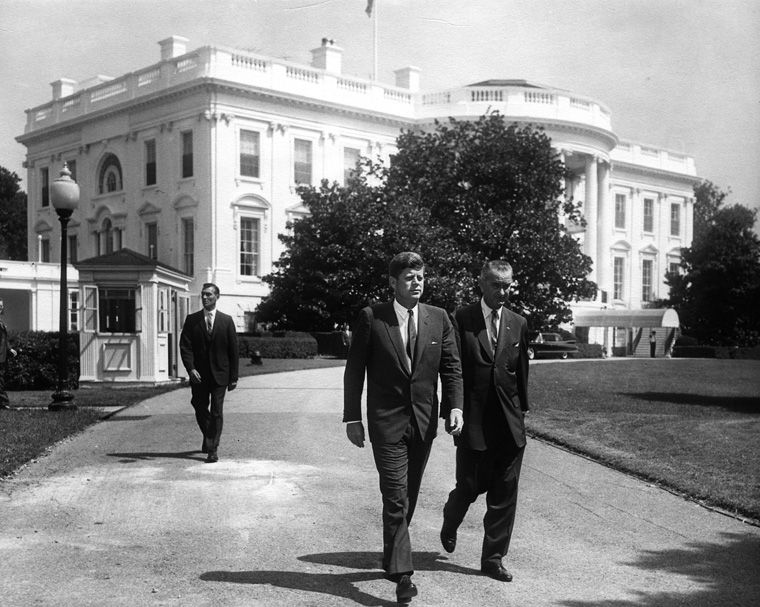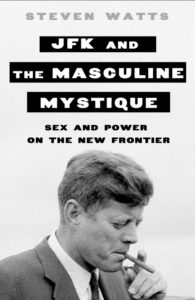by Steven Watts
In the crisis of masculinity that preoccupied so many in late 1950s America, a few beacons of hope pierced the gloominess. Cosmopolitan, in its 1957 special issue examining the conundrums of the modern American male, included a piece titled “The Fascinators.” It presented brief sketches of thirty-five men. All men had been selected by women as particularly interesting, attractive, and compelling figures. They seemed to provide models for masculine regeneration. Near the front of the list appeared a youthful political figure with this description under his photo graph: “The tall, sandy-haired Democratic Senator from Massachusetts defeated Henry Cabot Lodge Jr. in the race for the United States Senate by attending tea parties.

The Endorsement of The Ugly American
Now thirty-nine and married to a pretty photographer, he is the author of a best-selling book, Profiles in Courage. Also he has been mentioned as the next Democratic Presidential candidate.” This same senator also signaled masculine redemption with a high profile public endorsement of The Ugly American. A popular novel that had raised such an alarm about weak, glad-handing American men and the dangerous implications for the Cold War. On January 23, 1959, he took out a full-page advertisement in The New York Times. Together with several other prominent figures he praised the The Ugly American. It was, said the text, a compelling critique of “the Americans who go overseas for the various governmental agencies, their activities abroad, and the policies they are entrusted to carry out.” The senator then sent a copy of the novel to every member of the Senate.
The Crisis of Modern American Masculinity
A short time later, he wrote privately to the author Eugene Burdick. He explained that it had been “a pleasure for me to give a public endorsement of The Ugly American, which I also feel has begun to have some visible influence both in Congress and in Foggy Bottom [the State Department].” Subsequently, he gave speeches addressing “the economic gap” in underdeveloped countries and the need for “a volunteer corps” of young people who would personify the physical and personal virtues of the effective Americans praised in the novel. In the senator’s words, “Many have been discouraged at the examples that we read of ‘the ugly American.’ And I think the United States is going to have to do much better in this area if we are going to defend freedom and peace in the 1960s.”
As these episodes made clear, at least one prominent American was meeting head-on the crisis of modern American masculinity. Senator John F. Kennedy, a youthful and confident political figure with an eye on the White House, seemed to embody everything many American men felt nervous about losing in the postwar era. Physical vigor, decisive action, personal heroism, individual initiative, tough- mindedness, and abundant sex appeal.
As he geared up to run for his party’s presidential nomination in the mid-1950s, he relied upon the usual partisan boilerplate of the Democratic Party— condemning Republican reliance on the wealthy, upholding the federal government’s regulation of the economy and protection of the less affluent, advocating the need for vigorous prosecution of the Cold War— but here he differed little from his Democratic opponents such as Hubert Humphrey, Stuart Symington, Lyndon Johnson, and Adlai Stevenson. What set JFK apart was his personification of vigorous, elegant, assertive manhood. An aura of confident masculinity permeated both his persona and his campaign.
Kennedy Accepts the Democratic Party’s Nomination
Upon accepting the Democratic Party’s nomination in the summer of 1960, Kennedy revealed the essence of this appeal. In ringing tones, he proclaimed that the time had come for a new generation of leadership— new men to cope with new problems and new opportunities:
All over the world, particularly in the newer nations, young men are coming to power— men who are not bound by the traditions of the past— men who are not blinded by old fears and hates and rivalries— young men who can cast off the old slogans and delusions and suspicions. . . .
[W]e stand today on the edge of a New Frontier— the frontier of the 1960s. . . . I am asking each of you to be pioneers on that New Frontier. . . . [C]ourage— not complacency—is our need today— leadership, not salesmanship. And the only valid test of leadership is the ability to lead, and lead vigorously.

A Regeneration of American Masculinity
All the touchstones of the Kennedy campaign— and image— were there: youth, strength, toughness, decisiveness, courage, imagination, vigor. And woven throughout was the bright thread of “young men” moving forward to seize their historical moment. These were more than rhetorical tropes. For JFK, the picture of vigorous young men replacing a tired, unimaginative, tradition-bound generation of older males held the key to his considerable political appeal. The candidate John F. Kennedy’s stylish rendering of regenerated masculinity promised to resolve the cultural crisis of the late 1950s. It would make him a new kind of political figure and promised to make him a new kind of president.
STEVEN WATTS is an award-winning professor of history at the University of Missouri. He has been a consultant and on-screen expert for several documentaries. Appearing on PBS, the History Channel, NBC, CNBC, CBS, Bloomberg News, and Fox. He is the author of JFK and the Masculine Mystique.

